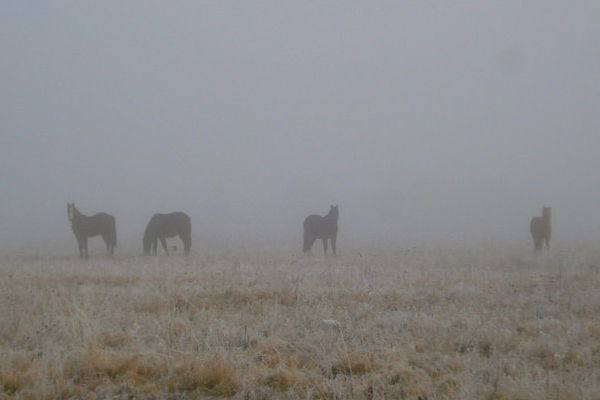In the winter of the blizzards that persisted into March, my father took a contract job three hours away in Ohio. He lived there during the week and only came home on the weekends. A programmer by day and a farmer by night, his daily chores fell to me, a senior in high school. We’d catch up on the major chores every weekend—like hauling hay and repairing the barn—but daily I milked the goats and gathered the eggs and grain-fed our fat, happy quarter horses. Echo Rouge was our registered matriarch, her lineage unblemished until she accidentally became impregnated by her son, D’Artagnon, whom we’d dubbed “Danny.” We’d taken a May vacation the summer before, enlisting the neighbors as stock-sitters, only to find Danny, our painted foal, a stallion upon our return. “We take one stinking vacation in fifteen years,” my father groaned, “and look what happens!” Not only would Echo now be a mother and a grandmother, but Danny would become a father and a brother too, all at once. We began to sing that song by Ray Stevens, “I’m My Own Grandpa,” to try to cheer my father a bit, but it didn’t work, at least not for long.
However, horse incest was only one factor that drove my father away. We needed money, both to run the farm and the household, but also, my mother was a kind of crazy animal herself. One minute she loved, next she hated, and I think my father thought some time apart would be, let’s say, refreshing. They screwed in the afternoons, saying they needed to “talk” in their room, but they didn’t really like each other. They fought, and threw dishes, and when they did, I took to the hills. When they fucked, I soon learned to do my own fucking, and my boyfriend at the time, a broad-shouldered young man, lost his virginity to me on one such afternoon when my parents were otherwise occupied. Soon my father’s absence and my mother’s inconsistency allowed me other indulgent habits, such as “forgetting” to end my dates and snuggling down each night in my bed with my warm man-child. Still, my father knew that Fred was spending a lot of time at the house, so he charged us both with monitoring Echo Rouge. Her girth was tremendous, and though she required a full eleven months’ gestation, my father was worried.
My father impressed his anxiety onto me, Fred, and my mother to such an extent that we all woke one morning in a panic. Fred and I rolled out of my twin bed in a mad tangle of quilts to the noise of my mother yelling up the stairs. She was upset to see Fred emerge with bedhead, but only said, “You’d better check on Echo.” So early, before school, the wind still bitterly cold, Fred and I threw on jeans and flannel jackets and work boots for our trudge to the half-built barn. We found Echo progressing through labor, sides heaving and muzzle snorting. A painted foal lay on the ground—its pure whiteness splotched by a rich cocoa brown, so breathtaking in its birth—except not breathing, not moving—quite starkly dead, in fact—with its own embryonic sack sucked into its nostrils. I wanted to cry out in anger, to weep from a shame I didn’t understand, but then Echo strained as if to expel the placenta, and another babe burst forth—a filly, this time: a sister, a daughter, and a granddaughter. Thus, twins—both a marvel and a hazard for a horse, whose biology is not suited to breeding, carrying, or birthing nature’s multiples, unlike an old nanny goat, who can routinely produce twins, triplets, and quadruplets like a Pez dispenser.
This aberration was what came of incest, and my father had been wise to run from it.
Echo tended to her second birth, and the filly lived. We named her Lady Montague, and she grew to be as gentle as her mother/grandmother and her father/brother—kind horses, all. Before that happier ending though, Fred and I struggled to bury our Lady’s brother/uncle/cousin. The ground was as frozen as the tears that streaked our wind-whipped faces. We wept for guilt, for pure ineptitude, for our immitigable failure to safeguard the first-born foal, to wipe his face of the uterine phlegm that suffocated him while Echo was consumed by the second round of labor. While we’d conjoined in my bed, the first foal had suffered, squirmed for air, and expired alone. We couldn’t name him—we hadn’t the heart left in us once we’d dug the shallow, jagged grave rimmed with March ice and snow. He was dead and heavy and we’d drug him to the cold ditch, crying out like winter birds at our own uselessness. We covered him with clods and knelt by the low mound to say prayers that never came to our lips. Our teeth chattered and our chins quivered with the clichés of grief.
Death had rendered us siblings, and we never made love again.
Photo credit: Infomastern via Foter.com / CC BY-SA Photo credit: allispossible.org.uk via Foter.com / CC BY

